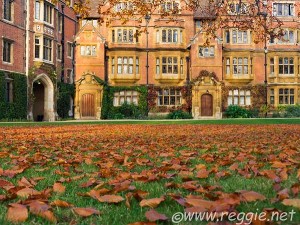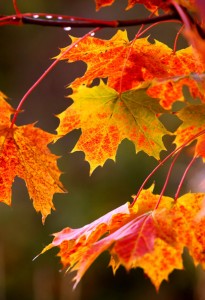September 22, 2012 was officially the first day of Autumn, or "Fall" as we Americans call it.
Long ago, when the air cooled and the leaves turned gorgeous shades of gold, red and burgundy, people did more than don sweaters and switch their clothing to darker colors.
In the Northern Hemisphere, the first day of autumn or fall is officially the day when the Sun crosses the celestial equator moving southward on September 22nd or 23rd. This day is called the Autumnal Equinox which is Latin for "equal night" when the days and nights are almost exactly twelve hours long.
Anciently, the Autumn Equinox or Harvest Home was called "Mabon," pronounced 'MAY-bon', after a Welsh god called Mabon ap Modron which literally means 'son of mother'.
The full moon nearest to the Autumn Equinox is called the Harvest Moon. Historically, farmers harvested their crops by then and had a harvest celebration.
One Mabon Celtic ritual was dressing the last sheaf of corn harvested in fine clothes, or weaving it into a wicker-like man or woman. Apparently, they believed the sun was trapped in the corn and needed to be set free. So they burned it and spread the ashes on their fields.
Mabon is also known as the Feast of Avalon, derived from the meaning of  Avalon being, 'the land of the apples'. It also traditional at Mabon to honor the dead by placing apples on burial cairns as a symbolism of rebirth. It was also a way for the living to anticipate being reunited with their loved ones who had passed on.
Avalon being, 'the land of the apples'. It also traditional at Mabon to honor the dead by placing apples on burial cairns as a symbolism of rebirth. It was also a way for the living to anticipate being reunited with their loved ones who had passed on.
 Avalon being, 'the land of the apples'. It also traditional at Mabon to honor the dead by placing apples on burial cairns as a symbolism of rebirth. It was also a way for the living to anticipate being reunited with their loved ones who had passed on.
Avalon being, 'the land of the apples'. It also traditional at Mabon to honor the dead by placing apples on burial cairns as a symbolism of rebirth. It was also a way for the living to anticipate being reunited with their loved ones who had passed on.
Many people often associate autumn with melancholy, and facing the end of the liveliness of summer and the beginning of the bleakness of winter. Grey skies cause many people to retreat, both physically and mentally. Autumn is the time of year when the celebrated English poet, John Keats, wrote his most acclaimed poem, "To Autumn" which has a distinctly melancholy beauty.
The ancient Celtics used this time to reflect on the past year as well as celebrate nature's bounty by having a feast and a celebration. I imagine those were the roots for the Thanksgiving feast we Americans we celebrate.
 Since Autumn or fall is when the torrid heat finally cools where I live in southwestern Arizona in the U.S., I welcome the seasonal change with open arms. Although we don't get the gorgeous color autumn is famous for having, I gaze wistfully and pictures of places that do.
Since Autumn or fall is when the torrid heat finally cools where I live in southwestern Arizona in the U.S., I welcome the seasonal change with open arms. Although we don't get the gorgeous color autumn is famous for having, I gaze wistfully and pictures of places that do.
Is there any fun personal or family tradition you do during autumn?







